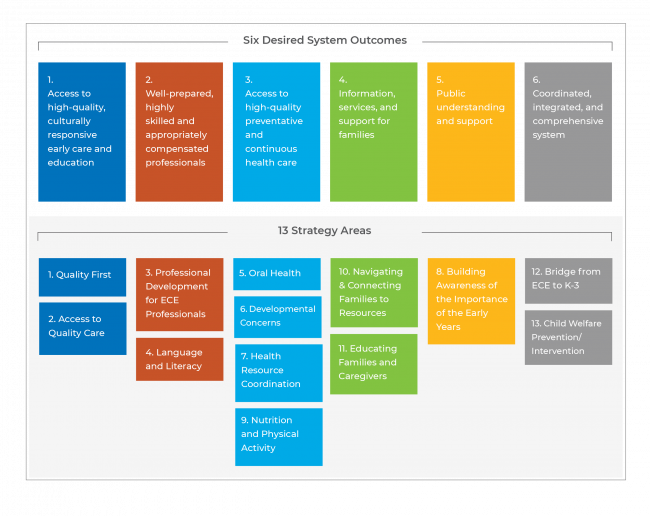 Improving Outcomes for Arizona’s Youngest Children Improving Outcomes for Arizona’s Youngest Children
The first five years of a child’s life have a powerful impact on their future, and on the future of our state. These early years offer an unmatched opportunity for our state and local communities to build a solid foundation for success for Arizona’s youngest children. First Things First (FTF) is an essential leader and partner in supporting the development, health and early learning of children birth to age 5. After an extensive two-year planning development process, and collecting public comments in January 2022, FTF has finalized the organization’s State Fiscal Years 2024-2027 Strategic Plan. FTF is deeply grateful for the time, thoughtfulness and dedication of the many Arizonans who participated in this in-depth process, including the FTF Board and Strategic Planning Committee, regional council members, as well as FTF partners representing throughout our state. Their commitment and expertise have significantly contributed to the proposed FTF Strategic Plan and FTF’s next level of statewide excellence. FTF and its 28 regional partnership councils statewide will use this document to plan programs and services to be implemented starting on July 1, 2023, as well as ongoing system-building work.
|
About First Things First
Our Vision:
All Arizona children are ready to succeed in school and in life.
Our Mission:
First Things First is an essential leader and partner in creating a family-centered, equitable, high-quality early childhood system that supports the development, well-being, health and education of all Arizona’s children, birth to age 5.
Our Values:
- Arizona’s children, birth to age 5, and their families are our central focus. We provide the best opportunities to prepare Arizona’s children for success in school and life, while ensuring each child’s well-being.
- Equity-Focused – We acknowledge, address and work to solve the unique challenges facing many children and their families.
- Innovative and Continuously Improving – We are flexible and open and do what is best for children and their families.
- Accountable – We demonstrate that our work truly improves the lives of children and their families.
- Strong Stewards – We demonstrate transparency and sound financial management of public and private funds and we advocate for additional investments in early childhood development and health to address unmet needs.
- Diverse and Inclusive – Our partners, regional council members, staff and Board are essential to the equitable delivery of the mission. We are inclusive and strive to reflect the diversity of our state. We treat everyone with dignity and respect.
- Collaborative and Cooperative – The success of our work depends on others and we maintain a diverse, inclusive, and equitable culture of strong collaboration and cooperation both internally and externally.
Historical Framework
In 2010, First Things First convened the first Early Childhood Task Force to establish a vision and design a model early childhood system that addressed all facets of young children’s healthy development. The 2010 Task Force knew the model system must be one in which all of Arizona’s early childhood partners — including families, early educators, health providers, state agencies, tribes, advocacy organizations, service delivery organizations, philanthropies, faith-based institutions, business representatives and others — played a role.
Six Desired Outcomes
The model early childhood system developed in 2010 identified six outcomes that are still relevant today. When the early childhood system is successful, everyone will benefit from living in communities where:
All children have access to high-quality, culturally responsive early care and education that promotes their development.
All early childhood education and health professionals are well-prepared, highly skilled and compensated based on their education and experience.
All children have access to high-quality preventive and continuous health care, including physical, mental, oral and nutritional health.
All families have the information, services and supports they need to help their children achieve their fullest potential.
All Arizonans understand the importance of the early years and the impact of early childhood development, health and education on Arizona’s quality of life. As a result, they substantially support — both politically and financially — a model system that delivers these benefits.
The early childhood system is high-quality, centered on children and families, coordinated, integrated and comprehensive.
Strategic Planning Process
During FTF’s comprehensive strategic planning process, these six desired outcomes were the organizing basis for an extensive review of FTF’s past and current work. To complete this review, 13 strategy area review groups were convened over a nine-month period. The groups included a comprehensive and inclusive set of statewide early childhood stakeholders, including FTF state Board members, FTF regional council members, FTF staff and system partners with expertise in the particular area of focus. The work of these strategy area review groups included reviewing:
- Current work being done at the statewide and regional levels, including programmatic strategies as well as system-building work;
- The impact and effectiveness of system-building and programmatic strategies; and
- The alignment of programmatic strategies and system-building work with the FTF state statutes.
In addition, the groups conducted an external scan to identify other entities’ responsibilities and authority in the strategy area and current efforts being performed by partners. The groups also examined the effectiveness of FTF work in the area, including implementation challenges. Finally, the group considered best practice opportunities, including potential innovative practices and alternative approaches.
The chart below shows how the 13 strategy areas align with the six desired early childhood system outcomes. FTF strategies were clustered within these 13 strategy areas to better identify opportunities and synergies. This clustering of strategies allowed for deeper analysis and discussion by the strategy area review groups.

Guiding Principles
The following guiding principles shaped the implementation of FTF’s SFY24-27 Strategic Plan. These are the framework through which all goals and actions should be pursued, viewed and understood.
With an emphasis on the whole child, FTF will serve Arizona’s children:
- birth to age 5, and their families and caregivers;
- across diverse socio-economic, geographic, cultural, and educational backgrounds;
- with a priority on lower socio-economic, at-risk children and their families; and
- a focus on the cognitive, physical, health, and social and emotional well-being of each child.
FTF’s Board in conjunction with Regional Partnership Councils will continue to partner to:
- equitably and effectively serve both urban and rural communities;
- collaborate with state agencies and tribal nations; and
- foster public/private collaboration and collective impact.
FTF will continue to lead the early childhood system, with a focus to:
- leverage its subject matter expertise across the state;
- convene and align stakeholder partners; and
- position for sustainable equitable statewide future funding.
FTF will foster a data-informed approach, that:
- continuously improves programs and strategies; and
- actively promotes a more vibrant data sharing network amongst our partners.
In addition, FTF’s commitment to diversity, equity and inclusion — as outlined in the FTF Equity Vision Statement — were elevated throughout strategic planning and will continue to be prioritized during the implementation of the plan.
| FTF SFY24-27 Strategic Direction
The in-depth analysis of FTF’s current 13 strategy areas led the FTF state Board to prioritize six strategy areas. The FTF SFY24-27 six priority strategy areas were selected based on the FTF vision, mission, statutory objectives as well as FTF’s unique role, other organizations’ roles and areas of need which are not already the responsibility of another agency. The prioritized six strategy areas include:
These six strategy areas currently account for 85% of FTF funding statewide. The seven non-prioritized strategy areas including health-related areas are still available for FTF regions to invest in.
Download the First Things First SFY24-27 Strategic Plan for full details. |

